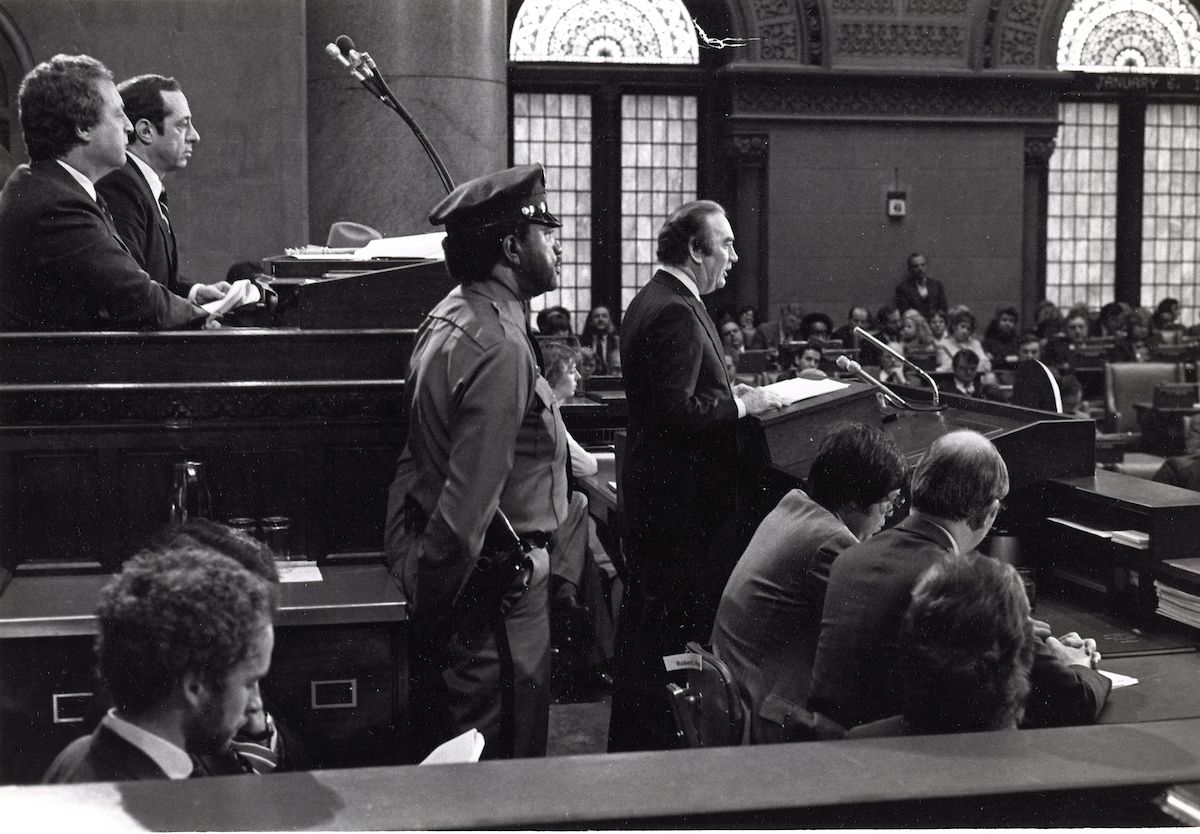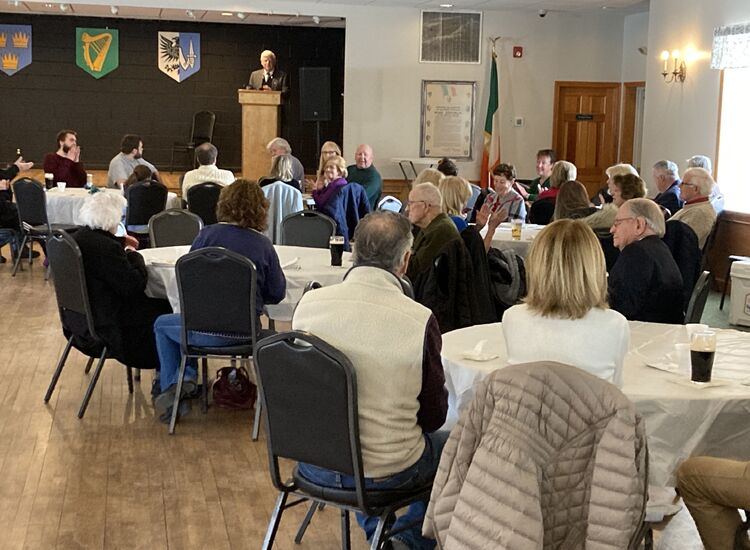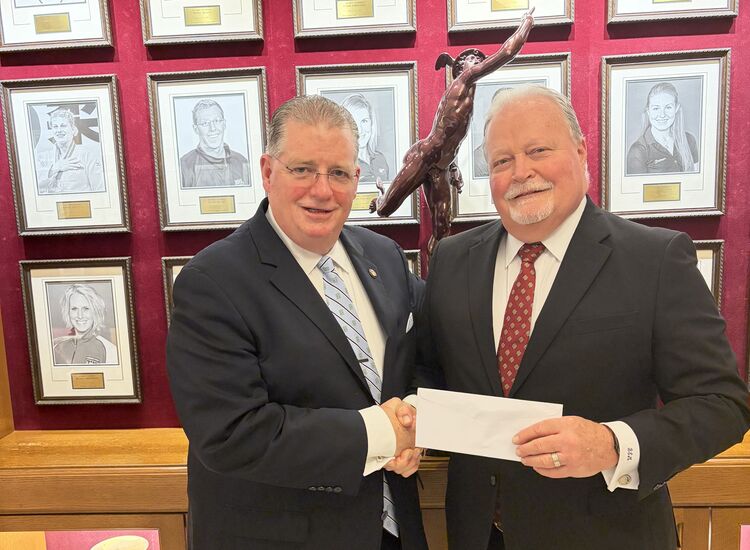Peter Quinn, in his memoir “Cross Bronx: A Writing Life,” compares the speech-giver to a jockey mounted on a racehorse.
So, he was asked recently, did that make the speechwriter, which he was over a career of 25 years for two New York State governors and five CEOs, like a trainer?
“No, a groom” was the reply.
The animal would be shoed and have all the other groom things done to it. “And if the horse loses, it’s my fault,” he said.
There are sometimes reminders in person – and frequently on the page – that the speeches Quinn delivers himself are much funnier than those he wrote for his various bosses. The novelist, essayist and now memoirist stole his own show when “Cross Bronx” was launched at the new Irish Arts Center on Oct. 13. Some attendees wondered aloud if they could somehow get a copy of his remarks.
An early lunch, subsequently, on a sunny day with almost no-one else around, was a relaxed contrast to the bright lights and a crowd happy to be in from the wet Manhattan night with glass in hand.
Maud’s Tavern is just up the hill from the Hastings-on-Hudson train station, which is where, for many years of his writing life, Quinn took the 6:10 weekdays to Grand Central Terminal. From 7 to 9 a.m., he worked on his own writing in the office before his speech-writing for Time Inc. His evenings and weekends were free to spend with his wife Kathy and their children. “I didn’t want them to think they couldn’t play with me or go near me,” he said of his daughter Genevieve and son Daniel.
They have careers now and spouses, and Quinn became a grandfather in 2021 to Lila Viola. At work currently on a fifth novel, he writes mornings in his attic office.
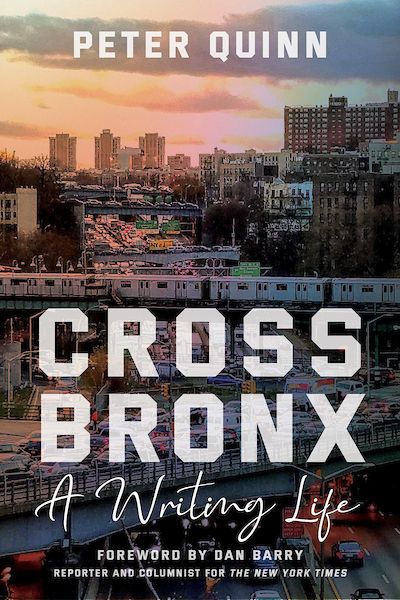
In early 1979, he was still a New York City resident and single when he signed on to work for Gov. Hugh Carey. An observer looking back might believe this surely was his perfect job. He was steeped in and passionate about New York’s social and political history; he was a 3rd-generation Democrat, beginning with his grandmother born in New York in 1863, and his father, Peter A. Quinn, had been a state assemblyman from 1936 to 1944, a U.S. congressman, from 1945 to 1947, and a judge from the late 1940s through his death in 1974.
Both Carey and his successor Gov. Mario Cuomo were from the same background – “outer-borough ethnic Catholics who’d been altar boys”; additionally, “both were highly intelligent and both valued words,” attributes that even Quinn’s enemies, were he to have any, would concede are his, too.
Prior to that, Quinn was doing his doctorate in history and working on the papers of Daniel O’Connell under the supervision of Fordham Professor Maurice O’Connell, the Liberator’s great-grandson. “He was very conservative,” he said. “I was very liberal. But we got along. He was a real gentleman.”
Quinn was talent-spotted for the first phase of his speech-writing career, and head-hunted for the second, when he left politics for the corporate world at Time Inc. and its successors. Carey, who’d known his father, liked an article he’d written for the Jesuits’ weekly America and after a brief trial period he was hired.
It was the perfect job indeed, except, “I’d never written a speech.” And there was a second problem: “I never wanted to go near politics.”
Quinn was once asked to write a book about speech-writing, mainly because it was known that he was the co-author with Cuomo of some of his most iconic speeches, despite a well-cultivated impression that the governor, unlike other politicians, wrote his own. He declined the offer and instead imparts his advice on the topic in a few brief paragraphs in “Cross Bronx.”
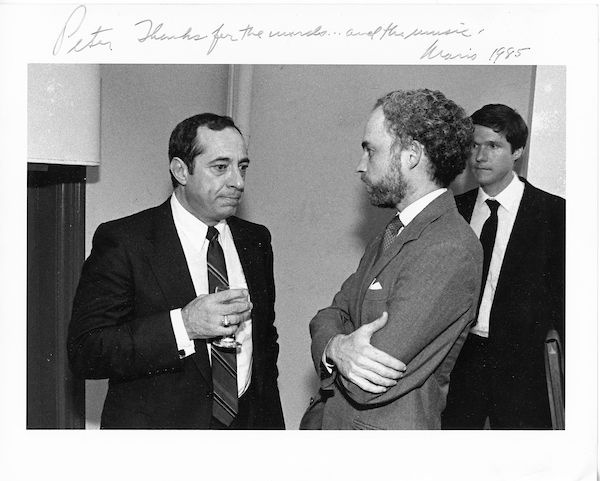
"Peter, Thanks for the words…and the music, Mario 1985.” A few years later, Gov. Cuomo reminisced to Peter Quinn about how "our words" had made a difference.
He can write straight-up heroes and villains. There are quite a few in “Cross Bronx.” Carey and Cuomo, though, are sometimes distant, complex father-figures, and not unlike Justice Quinn in that and some other respects.
All were old-line New Deal Democrats, and if there’s an underlying thread to Quinn’s political perspective, it is his horror at the counterrevolution, the attempt to undo the achievement that was the societal breakthrough of FDR’s 1930s. He has been a close observer of that and the overall playing out of American history through much of his adult life.
It began, however, the year before his and his fraternal twin and best friend Tom’s birth with the midterms of November 1946, which the Democrats lost. Congressman Quinn of the Bronx was among the casualties. Progress towards healthcare for all was halted. One look at the teeth and a general physical assessment of the men who served in World War II should’ve created a consensus around such a goal. “It never happened and still hasn’t happened,” Quinn said.
Yet, there was a consensus then that what was in place wouldn’t be undone. People like President Eisenhower were on board, but thus far and no further was their approach.
For loyal Irish Catholic Democrats, and Quinn has been life-long and practicing on all counts, John Fitzgerald Kennedy’s arrival in the Bronx was “like the second coming of Christ. He came up the Grand Concourse on the back of a limousine. I can still see him there.”
Peter A. Quinn was running for the State Supreme Court and appeared with the party’s presidential candidate on the dais that day.
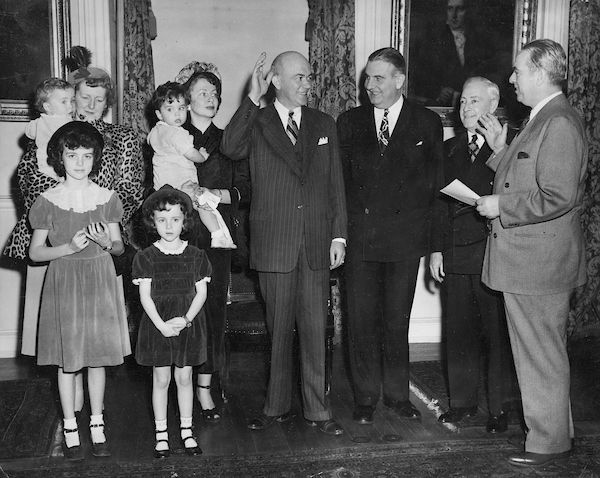
Peter Quinn is in his Aunt Marion's arms on the extreme left, while Tom is in his mother's arms, and sisters Sheila and Kathleen are in the front row as their father is sworn in as a judge by Mayor William O'Dwyer (1949).
When Peter Quinn, the younger, reported for duty with Gov. Carey, an old hand told him that his father’s State Assembly colleagues would stay on in the chamber to listen to him speak. Even the Republicans did, if he wasn’t attacking them.
His New York Times obituary reported his friends described the judge as “witty and brilliant” and that he was known for his Irish stories and Irish songs. In fact, his son reveals that he aspired to be an actor and a songwriter. His own father – his grandson calls him “a hard, intimidating, demanding man, not given to emotional displays” – put a stop to such ambitions.
Patrick Quinn, a union militant and organizer who left Tipperary with his family as a child, insisted on a civil engineering degree at Manhattan College and pushed him into politics. Peter A. Quinn also studied for a degree at Fordham Law School at night.
This first-rate political debater and one-time aspiring actor and songwriter was ill-at-ease, nonetheless, around his four children when it came to certain subjects, or, at least, one subject in particular.
“My father left the room when a Maidenform bra ad appeared on TV. My mother [Viola Murphy Quinn, who majored in classics at St. Vincent’s College] complained, ‘Do you want the boys to think their father was the milkman?’ If it meant he didn’t have to uncap a can of procreative worms with us, he sided with the milkman,” Quinn says in “Cross Bronx.”
“My mother had a private coming-of-age discussion with my sisters,” he writes, “The possibility that my father would do the same with my brother and me was as likely as Dwight Eisenhower having phone sex with Marilyn Monroe.”
‘Vocational wanderlust’
The nation’s political future was to be defined long term by Ronald Reagan’s hero Barry Goldwater, the GOP’s presidential candidate defeated in 1964, who stressed sturdy individualism, the sort that made his family’s fortune out West, even though the reality was it had been made possible by the Federal government every step of the way.
By the mid-1960s, Peter Quinn and his generation faced the prospect of becoming cannon-fodder in the killing fields of Asia. He and Tom applied to be 1-AOs, willing to serve as conscientious objectors, a position supported by some elders, including religious teachers, and opposed by others. Ultimately, a high number in Nixon’s lottery saved them from going to war.
“The vocational wanderlust that followed my college years,” Quinn writes, “was part of a generational drift.”
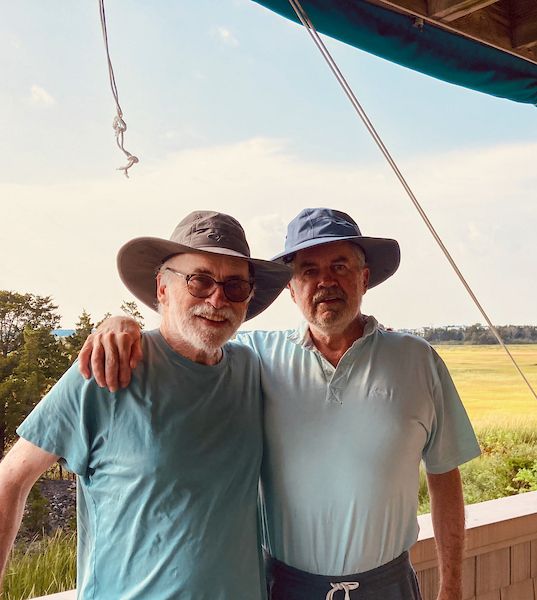
The Quinn twins, Peter and Tom.
His VISTA year, enlightening on the issue of race in particular, in the Kansas version of Kansas City, has been mentioned already in these pages. There was also the stint teaching at an all-boys Catholic school in New Jersey, which landed him in hot water when he took a class to the film version of Kurt Vonnegut’s novel “Slaughterhouse Five.” The school principal spent an afternoon taking calls from “incensed parents who learned of their boys’ reckless exposure to the naked upper half of a woman’s body.”
In another misadventure, he found himself in court posing as a lawyer before a surprised Justice Quinn. He was working as a messenger for an over-stretched Wall Street law firm that sent him to verbally agree to a postponement the opposing parties had pre-arranged. “Rather than wait, I called him that evening,” Quinn says in his account. “Longer and louder than expected, the verbal scourging is seared in memory.”
He tested for a position as a court officer and got it, the ideal as far as his father was concerned. The son grew up hearing, “What’s the pension like? The vacation?” Quinn agreed with the ideal in principle; part of his problem with political and business leaders is that they downsized and generally eased out the concept of pensions for regular folks.
Quinn senior told him in essence: do your 30 years and you can also study for law at night. But that job wasn’t for him long term, and his father was visibly displeased when he told him he was quitting. The law school at night idea didn’t have much appeal either. History did, but the path to tenure by the late 1970s was a difficult one. After taking up Carey’s offer, there was to be no way back to the doctorate. “I’d done the orals, and taken the language exam. I’m ABD, all but dissertation, or as we used to say ‘all but dead,’” he said.
And so, one minute he was in the rarefied world of academia studying the papers of Daniel O’Connell, who’d died 100 years before his birth, the next in the governor’s helicopter.
“It had its thrilling aspect,” he recalled more generally of those years. He was writing speeches that might and did appear on Page 1 of the New York Times, and more often in Section B, which was like the sports pages for state and city politics.
Carey was one of the best governors in the state’s history, he believes, not least because by making some tough decisions on the budget he prevented its decline becoming a fall.
“He never talked about ‘welfare queens,’ he never attacked the poor,” Quinn said. “He was the last of the great traditional Democrats.”
Carey, a former Brooklyn congressman – elected in 1960 for the first of seven terms – was comfortable dealing with the “nuts and bolts” of politics, in his former speechwriter’s view. Cuomo, on the other hand, would become “wedded to ideas.”
“Carey said there were only two possibilities: I’m either right or I’m wrong,” Quinn said. “He thought Cuomo should be a sociology professor in a junior college.”
“Governor Carey could be prickly and demanding,” he writes in the memoir. “He was also direct, funny, appreciative, and often encouraging.”
Quinn enjoyed marching with the governor in the New York St. Patrick’s Day Parade. One year, a dedicated group of harassers followed Carey down Fifth Avenue, subjecting him to the “full Anglo-Saxon lexicon” over his refusal to sign a death penalty bill. He smiled and waved through it and dismissed a suggestion that he exit early as the group became ever more heated.
“If he was bothered by the hecklers, he gave no sign. They fell away and he kept on marching,” Quinn writes, adding about a boss who had been a much-decorated combat soldier in World War II, “He could be verbally abused and threatened. He couldn’t be intimidated.”
While working for Gov. Carey, the speechwriter liked talking with Lt. Gov. Cuomo, who had a range of interests: history, theology, philosophy, sports. Then under Cuomo, Quinn participated in the writing of some of the most discussed speeches of the time: for example, the one given at St. John the Divine Cathedral in Manhattan entitled “The Stewardship of Political Power,” the keynote address at the Democratic National Convention, the University of Notre Dame speech and the Yale speech – think of the Triple Crown, with the Breeders’ Cup thrown in.
“After six and a half years, it wasn’t a thrill,” he said. “I don’t see how anyone could work for governors for six and a half years and not get burned out.”
‘Unbridled greed’
Time Inc. presented a fresh challenge as he knew nothing about the corporate world. “I had to learn it by the seat of my pants,” he said.
There was to be one more political episode, however, when Cuomo appeared to move toward a 1992 presidential bid. He even hired a plane to go to New Hampshire to make the announcement. It was waiting on the tarmac in Albany.
Quinn had had an offer about going back. Cuomo was more indirect as he reminisced on the phone about how “‘our words’ had made a difference.” For the speechwriter, supporting his family was his main priority, and this would mean a big pay-cut. “But for someone of my background,” he said of the possibility of writing speeches for the president of the United States. “I couldn’t pass that up.”
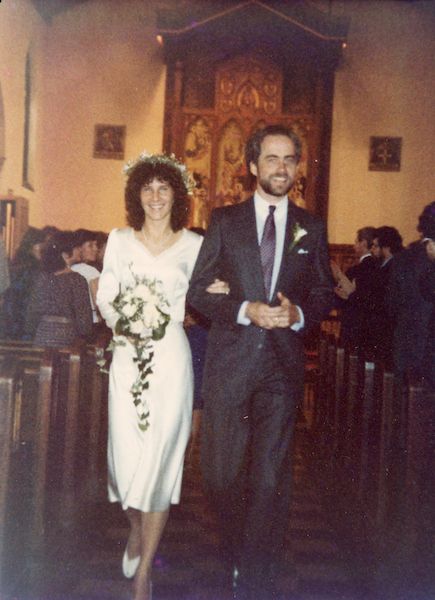
Kathy Burbank and Peter Quinn got married on Oct. 3, 1982.
He got permission to leave for a while and he told everyone about the plan. Embarrassingly, it was at Time that he heard Cuomo wouldn’t be taking that plane. A colleague walked into his office and declared: “He’s not running!”
“I looked like an idiot,” Quinn remembered.
He called Cuomo early the next morning to ask, (expletive omitted) “Governor, pardon me, but what was that all about?”
The indecisiveness of the “last liberal,” AKA the “Hamlet on the Hudson,” meant that other viable candidates didn’t make a move until too late, and Bill Clinton prevailed with his more centrist agenda.
Despite all that, Quinn generally expresses more respect, and affection, for his political bosses than for the corporate ones.
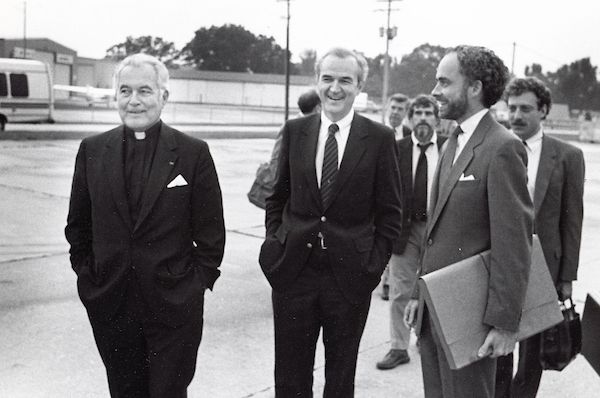
Peter Quinn pictured with the Rev. Theodore Hesburgh, president of the University of Notre Dame, left, and the Rev. Richard McBrien, head of the Department of Theology, center, before Gov. Mario Cuomo's speech there, "Religious Belief and Public Morality," in 1984.
“The CEO doesn’t really answer to his employees the way the politicians do [to the electorate]; they don’t face the same pressures as a politician," he said.
Otherwise, he remembered, “it was same world of power and assassination, only slower.” The “assassinations” were metaphorical, of course, with the victims getting millions of dollars to walk away.
Quinn writes in his prologue: “Bad behavior isn’t illegal. I witnessed unbridled greed, treachery, mental cruelty, but never a crime or felony, unless evidence comes to light that I’m not aware of, which I will not rule out.”
It becomes clear as the story unfolds that the author is referring mostly to the corporate phase of his speechwriting career. It could’ve been worse – he passed up the possibility of working with GE’s CEO Jack Welch: “Making a living was one thing, putting myself in the hands of Hannibal Lector was another.”
Quinn was raised in the church and the party. His parents were serious and educated Catholics; his grandfather had been a labor militant. Now it was the era of the celebrity CEOs, such as Welch and Lee Iacocca, and of Reagan. This world without consequences would lead eventually to a TV celebrity becoming president of the world’s sole superpower, despite his multiple bankruptcies. Bronx lawyer and FDR-era powerbroker Ed Flynn once said: “Beware the amateurs.” For Quinn, Trump is the ultimate and most dangerous type of amateur.
In conversation he threw out some figures from memory that summed up the world that the Reagan revolution wrought. When he started at Time in the mid-1980s, an editor might get a salary of $85,000, while the CEO received $300,000 annually. The equivalent figures when he left a couple of decades later were $192,000 for the editor, while the CEO got $17 million, close to 100 times that. “There was a concentration of wealth,” he said, which is something that Cuomo predicted.
There was also constant upheaval amid often disastrous business decisions.
On Jan. 14, 2001, two of the company’s top bosses were on hand for the ringing of the bell at the New York Stock Exchange for the first day of AOL Time Warner stock being traded. In his “Zelig Moment,” Quinn appeared in a Financial Times picture of the event that suggested that he was part of the troika running the company. Kathy Quinn said the image reminded her of the defendants’ box at Nuremberg. Except there would be little holding to account for something her husband said was “all downhill” from there.
At some point, Quinn realized that he wanted to get his name in print, to make his own mark as a writer, which had been an early ambition. Looking back, he sees now that the constant deadlines, the need to get stuff right and the 7 to 9 a.m. schedule over many years all proved a good preparation for the role of author.
“I did that for 17 years and got three novels [of the four] out of it,” he said of the two hours in the morning.
Quinn was always happy to disabuse people about the romanticism of writing, particularly if it was someone who’d say they were going to take it up after they retired from real work. “Oh, you’re going to do what I do?” he’d ask them rhetorically. “Go into a room alone for five hours and drive a nail into your head?”
Gradually the person the novelist Colum McCann has called “one of our finest storytellers” emerged. An element of that would be investigating his tribe, in part via his own family, which led to the essay collection “Looking for Jimmy.” His mother was not at all enthusiastic about such delving; she liked to dispose of the written records. Viola Quinn, the “anti-genealogist,” felt that family secrets were secret for good reason.
Another was Fintan Dunne, the “cynical humanist” World War I veteran at the center of his trilogy of historical detective novels, “Hour of the Cat,” “The Man Who Never Returned” and “Dry Bones.”
But the trained historian became a writer of historical fiction beginning with a year, 1863, a place, New York, and a person, his grandmother.
Quinn knew the 19th century well – not just through the study of O’Connell, “a classic European liberal,” but also through his doctoral work on John Devoy, who was born in County Kildare in 1842, and led the Fenian movement from New York for 50 years (the novelist’s friend Terry Golway would write the biography).
The story of his forebears, though, couldn’t be written as regular history, he realized; it had to be re-imagined through a process of immersion in their times. After 10 years of research, “Banished Children of Eve” was published.
Quinn read the Civil War newspapers, the magazines, the documents, year in and year out; he haunted the streets. “I had to feel comfortable in that world,” he said. “That I wasn’t writing from the outside in. I was writing from the inside out.”
“Cross Bronx: A Writing Life" is published by Empire State Editions, an imprint of Fordham University Press.

